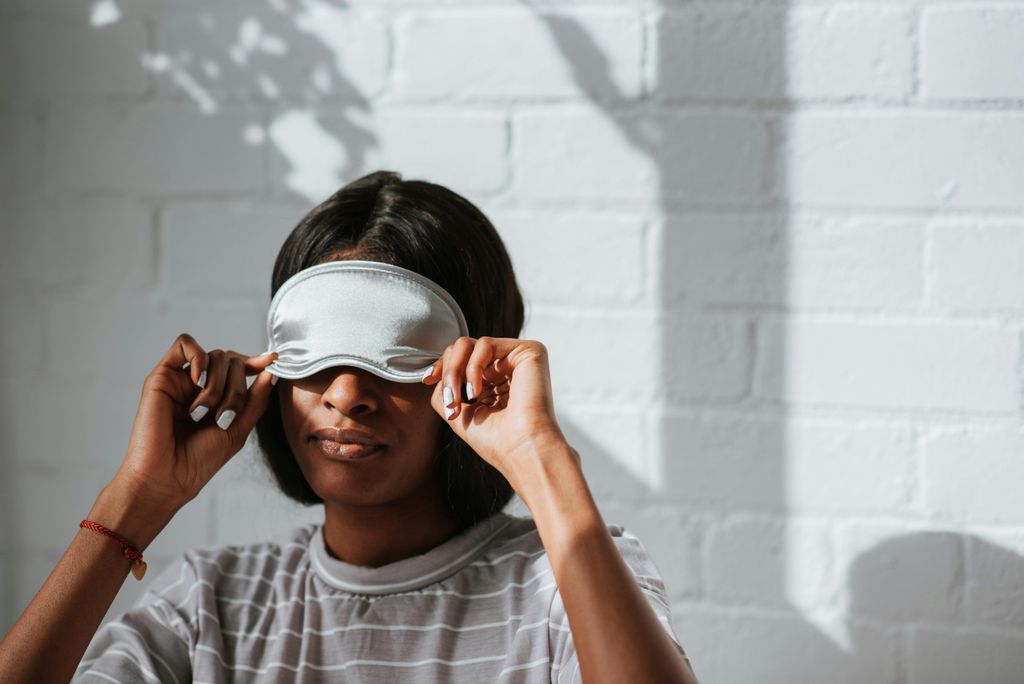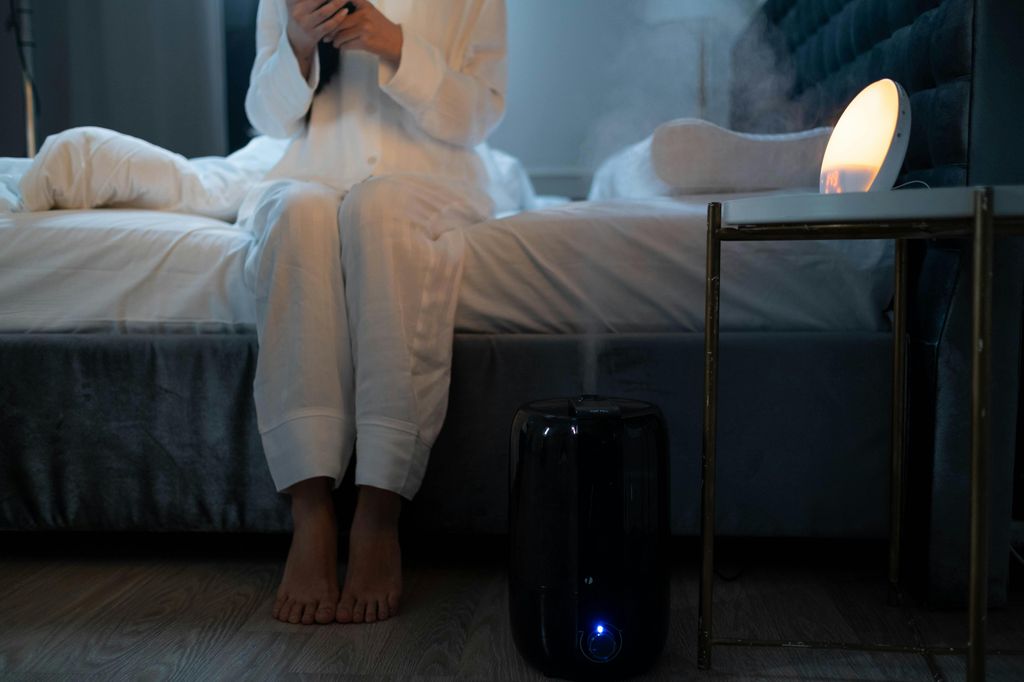
Can Probiotics Help You Sleep?

If you’re struggling to fall asleep or waking up feeling unrested, your gut might have more to do with it than you think. The gut and brain are closely connected, influencing everything from digestion to mood—and even sleep. Probiotics support gut health—and they might help you sleep better, too. In this article, we’ll explore the connection between probiotics, gut health, and sleep quality.

How Gut Health Affects Your Sleep
Your gut and brain are in constant communication, working together to regulate mood, digestion, and even sleep. This connection helps your body switch between being awake and asleep, making gut health an important factor in sleep quality. Let’s explore the different ways your gut supports sleep.
Neurotransmitter Production
Your gut bacteria play a key role in producing neurotransmitters and hormones essential for regulating sleep, like:
Most of your body's serotonin is made in the gut by special cells called enterochromaffin cells. An enzyme called tryptophan hydroxylase helps convert tryptophan from protein-rich foods into serotonin. In fact, the gut produces more serotonin than the brain.
Gut bacteria play an essential role in regulating serotonin levels by producing short-chain fatty acids (SCFAs) like butyrate. Butyrate boosts the production of tryptophan hydroxylase, further increasing serotonin production.
Only a small amount of the tryptophan you eat gets used to make serotonin. Most of it—over 90%—goes through a different process called the kynurenine pathway. This pathway creates compounds like kynurenic acid, which helps protect your brain, and quinolinic acid, which can be harmful in large amounts.
When your body is dealing with inflammation, it can send even more tryptophan down this pathway, leaving less available for serotonin production. This shift is linked to problems with mood and sleep in some cases. Since your gut bacteria affect both your inflammatory response and how tryptophan is used, a healthy gut may help keep things in balance.

Why does this matter for sleep? Serotonin provides the backbone for melatonin — the hormone that signals when it’s time to wind down and rest. Serotonin also supports a calm, stable mood and helps regulate your internal body clock (circadian rhythm), both essential for deep, restorative sleep.
Certain gut bacteria, like Lactobacilli and Bifidobacteria, also produce GABA (Gamma-Aminobutyric Acid), a neurotransmitter that helps with sleep. GABA itself might be too large to enter the brain from outside, but oral and gut bacteria GABA can help you relax through the gut. Conversely, an imbalance in gut bacteria can reduce GABA production, making it harder to fall asleep.
If your gut is out of balance, it can reduce beneficial bacteria and increase your inflammatory response, disrupting the gut-brain axis and affecting your sleep quality. This imbalance can interfere with the production of serotonin, melatonin, and GABA, contributing to sleep troubles.
A study of 26 healthy men explored the connection between gut bacteria diversity and sleep quality. Researchers determined that those with more diverse gut bacteria experienced:
- Better overall sleep
- Longer total sleep time
- Less waking during the night
This is a correlative study, so it’s unclear whether gut bacteria diversity improved sleep or vice versa.
Vagus Nerve
Building on the role of neurotransmitters like serotonin and GABA in sleep regulation, the vagus nerve plays a crucial role in transmitting these signals from the gut to the brain. This nerve acts as the communication pathway between the gut bacteria and the brain, relaying neurotransmitter signals that directly impact sleep patterns.
However, harmful substances gut bacteria produce, like ammonia and d-lactic acid, can also travel along the vagus nerve, affecting sleep quality and brain health. When this connection is disrupted, it can lead to sleep difficulties and mood disturbances.
Circadian Rhythm Interaction

Your gut has a clock, too. When that clock is off, your sleep suffers. Your gut and sleep cycle are more connected than you might realize. Just like your body follows a daily rhythm, your gut bacteria have their own internal clocks that sync with your sleep-wake cycle. These bacteria respond to signals like melatonin and light exposure, adjusting their activity in ways that can influence your sleep patterns.
We’ve discussed how your gut communicates with the brain through the gut-brain-microbiota axis, using neural pathways like the vagus nerve. It also sends signaling molecules in the bloodstream. This means your gut bacteria and their metabolites, like SCFAs, can impact the neurons involved in sleep regulation.
When your sleep schedule shifts—whether due to late nights, jet lag, or inconsistent routines—your gut bacteria can become imbalanced, affecting your ability to fall and stay asleep.
Light exposure also plays a role in this connection. Just as sunlight helps regulate your body's internal clock, it can also influence the rhythms of your gut bacteria. Disruptions in light-dark cycles can throw off your sleep patterns and the balance of your gut bacteria, making it harder for your body to maintain a healthy sleep cycle.
The gut also plays a role in sleep by impacting immune mediators. Molecules like SCFAs and cytokines, produced in the gut, travel through the bloodstream to interact with the brain.
- SCFAs, such as butyrate, acetate, and propionate, are produced when gut bacteria break down fiber. These compounds help regulate neurotransmitter production and interact with the vagus nerve, further influencing sleep.
- Cytokines like interleukin-6 (IL-6) and tumor necrosis factor-alpha (TNF-α) can cross the blood-brain barrier and impact neural circuits that control sleep. IL-6, when in balance, is linked to deeper sleep cycles, whereas disruptions in cytokine signaling can lead to sleep disturbances.
Maintaining a balanced gut bacteria and aligning it with your natural rhythms may be key to improving sleep quality. When gut health is compromised—whether due to poor diet, stress, or irregular sleep patterns—it can throw off these pathways, making it harder to fall asleep, stay asleep, or wake up feeling refreshed.
Signs Your Gut is Hurting Your Sleep

The connection between gut health and sleep is complex, and while disruptions in gut function could play a role in sleep disturbances, these signs may also stem from other health factors. If you're experiencing any of the following, your gut health might be contributing:
- Frequent Sleep Disruptions – Waking up multiple times at night could be linked to an imbalance in the gut microbiome, though other factors also contribute.
- Trouble Falling Asleep – Digestive discomfort or gut-related imbalances may make it harder to relax and drift off.
- Waking Up Tired – Poor sleep quality, influenced by gut health, diet, and lifestyle, can leave you feeling unrefreshed.
- Mood Fluctuations – Gut bacteria play a role in mood regulation, which can impact sleep patterns.
- Irregular Sleep-Wake Cycle – Disruptions in your routine can affect gut health and sleep quality.
These symptoms aren’t exclusive to gut health and could be linked to other underlying issues. Evaluating lifestyle factors like diet, stress, and sleep habits may help pinpoint potential causes. If sleep disturbances persist, consulting a healthcare provider can provide personalized guidance.
Can Probiotics Help You Sleep?
With your gut health closely tied to multiple factors in sleep, it’s no surprise that probiotics—known for supporting a healthy gut—are studied for their potential role in improving sleep quality. But do they really help? Let’s take a closer look at how probiotics might support better rest.
A meta-analysis of 15 studies found that probiotics may improve overall sleep quality but didn’t lead to significant changes in total sleep duration or sleep efficiency—the percentage of time spent asleep while in bed. This suggests that while probiotics may help you feel like you’re sleeping better, the measurable effects vary.
One study on 38 healthy adults examined how probiotics might influence mood, personality traits, and sleep quality and how these factors might be connected. Participants took a probiotic mixture containing Lactobacillus fermentum, L. rhamnosus, L. plantarum, and Bifidobacterium longum daily for six weeks.
Researchers measured mood, personality, and sleep quality at different points throughout the study. While there were no significant differences in sleep quality scores between the probiotic and placebo groups, those taking probiotics reported feeling noticeable improvements in their sleep after six weeks.
They also experienced significant mood improvements, leading researchers to suggest that probiotics may help sleep indirectly by enhancing neurotransmitter balance. This supports the idea that probiotics influence the gut-brain axis, affecting neurotransmitters regulating mood and sleep.
Which Probiotic Strains Work Best For Sleep?

A review of studies explored the effects of probiotics and sleep and found that certain probiotic strains have different impacts on sleep quality:
- Lacticaseibacillus casei Shirota improved sleep in stressed students, leading to better sleep scores and shorter time to fall asleep, though some studies found no significant changes.
- Lactobacillus brevis showed mixed results—EEG scans didn’t reflect significant changes, but participants still reported waking up feeling more refreshed.
- Lactobacillus helveticus improved sleep efficiency, meaning participants spent a higher percentage of their time in bed asleep.
- Heat-killed Lactobacillus gasseri was linked to better sleep quality, with men experiencing greater benefits than women.
- Multispecies probiotic blends, including Lactobacillus plantarum, Limosilactobacillus fermentum, and L. rhamnosus, showed sleep and stress resilience benefits.
While probiotics from the Lactobacillus family seem to be stealing the show, another strain deserving a mention outside of this review is Bifidobacterium Longum 1714.
A study with 89 healthy adults examined the effects of taking 1 billion CFUs of B. longum 1714 daily on sleep. After four weeks, participants experienced improved sleep quality and reduced daytime sleepiness. Although sleep tracking data showed minimal changes, participants reported feeling more energized and experiencing better social functioning by the end of the study.
Researchers suggest that B. longum 1714 may enhance sleep by modulating stress response and brain activity, potentially supporting better rest.
Supporting your gut health with targeted probiotics like Probiotic Breakthrough, which includes L. plantarum, or MicroBiome Breakthrough, with its blend of L. rhamnosus, L. gasseri, and L. helveticus, can help restore balance in your microbiome. These strains are designed to support digestive health and improve mood, possibly leading to better, more restful sleep. The L. plantarum OM in Probiotic Breakthrough produces high levels of GABA, which may improve relaxation and sleep quality through the gut.
For a more comprehensive approach to gut and brain health, Cognibiotics combines probiotics with 17 nootropic and adaptogenic herbs that boost cognitive function, mood, and stress resilience by improving gut flora. It’s designed to improve the balance of neurotransmitters, including serotonin and GABA, in the brain.
Why Results Are Mixed

Although researchers found mixed results, they suggest probiotics may support sleep by influencing mood, stress levels, and neurotransmitter production rather than by directly altering sleep architecture. Not everyone responds the same way to probiotics, prebiotics, or postbiotics for sleep. Several factors may influence how effective they are, including:
- Differences in gut microbiome composition and gut immune system
- The specific probiotic strain or formulation used
- Timing and duration of supplementation
- Sex differences in response to treatment
- Individual stress levels and sleep disturbances
Can Prebiotics and Postbiotics Support Sleep?
Beyond probiotics, the same review of studies determined that prebiotics and postbiotics may also play a role in improving sleep:
- Prebiotics like galactooligosaccharides help support healthy cortisol levels, which are often linked to how the body responds to stress.
- Short-chain fatty acids (SCFAs), produced by gut bacteria, support sleep by regulating immune function and neurotransmitters.
- Butyrate, a type of SCFA, increased deep sleep (NREM sleep) and helped regulate circadian rhythms in animal studies.
While research is ongoing, these findings highlight how gut-targeted therapies could support better sleep and stress management, even if research is still exploring the exact mechanisms.
Conclusion
Your gut health plays a crucial role in achieving restful sleep. A balanced gut microbiome, supported by probiotics, helps regulate neurotransmitters, stress levels, and brain activity, all of which can impact your sleep quality. While the effectiveness of probiotics may vary from person to person, research suggests they can improve sleep indirectly by promoting a healthier gut-brain connection and boosting mood.
If you're struggling with sleep disruptions, taking care of your gut health could be an important step toward better rest. Looking to support your gut and sleep? Add MicroBiome Breakthrough or Probiotic Breakthrough into your daily routine to support a balanced microbiome and better sleep quality.
If you’re looking for additional support for cognitive function and stress resilience, Cognibiotics offers a targeted solution to optimize your gut-brain connection further and support restful sleep.
References
- Sejbuk M, Siebieszuk A, Witkowska AM. The role of gut microbiome in sleep quality and health: Dietary strategies for Microbiota support. Nutrients. 2024;16(14):2259. doi:10.3390/nu16142259
- Tanaka M, Szabó Á, Vécsei L. Redefining roles: A paradigm shift in tryptophan-kynurenine metabolism for innovative clinical applications. Int J Mol Sci. 2024;25(23):12767. doi:10.3390/ijms252312767
- Abdou AM, Higashiguchi S, Horie K, Kim M, Hatta H, Yokogoshi H. Relaxation and immunity enhancement effects of gamma-aminobutyric acid (GABA) administration in humans. Biofactors. 2006;26(3):201-208. doi:10.1002/biof.5520260305
- Smith RP, Easson C, Lyle SM, et al. Gut microbiome diversity is associated with sleep physiology in humans. PLoS One. 2019;14(10):e0222394. doi:10.1371/journal.pone.0222394
- Teichman EM, O’Riordan KJ, Gahan CGM, Dinan TG, Cryan JF. When rhythms meet the blues: Circadian interactions with the Microbiota-gut-brain axis. Cell Metab. 2020;31(3):448-471. doi:10.1016/j.cmet.2020.02.008
- Pang X, Chen L, Xu G. New awareness of the interplay between the gut Microbiota and circadian rhythms. Pol J Microbiol. 2023;72(4):355-363. doi:10.33073/pjm-2023-046
- Ito H, Tomura Y, Kitagawa Y, et al. Effects of probiotics on sleep parameters: A systematic review and meta-analysis. Clin Nutr ESPEN. 2024;63:623-630. doi:10.1016/j.clnesp.2024.07.006
- Marotta A, Sarno E, Del Casale A, et al. Effects of probiotics on cognitive reactivity, mood, and sleep quality. Front Psychiatry. 2019;10:164. doi:10.3389/fpsyt.2019.00164
- Haarhuis JE, Kardinaal A, Kortman GAM. Probiotics, prebiotics and postbiotics for better sleep quality: a narrative review. Benef Microbes. 2022;13(3):169-182. doi:10.3920/BM2021.0122
- Patterson E, Tan HTT, Groeger D, et al. Bifidobacterium longum 1714 improves sleep quality and aspects of well-being in healthy adults: a randomized, double-blind, placebo-controlled clinical trial. Sci Rep. 2024;14(1):3725. doi:10.1038/s41598-024-53810-w
- Dos Reis Lucena L, Terra Loyola V, Leopoldino de Bortolli C, Levy Andersen M, Tufik S, Hachul H. Effects of supplementation with Lactobacillus probiotics on insomnia treatment. Altern Ther Health Med. 2021;27(S1):178-184.
